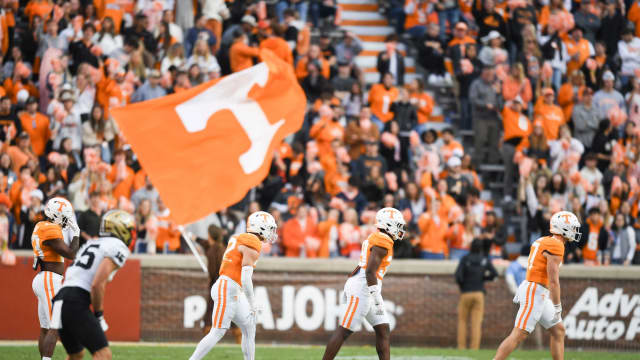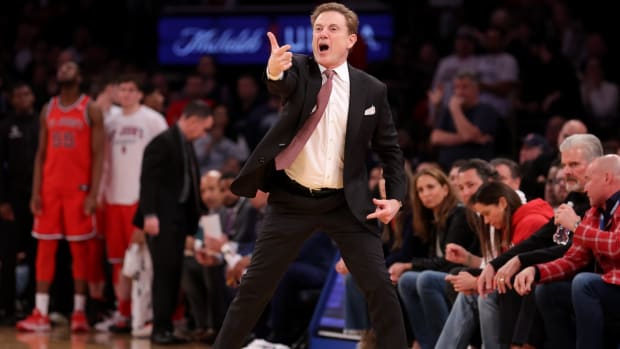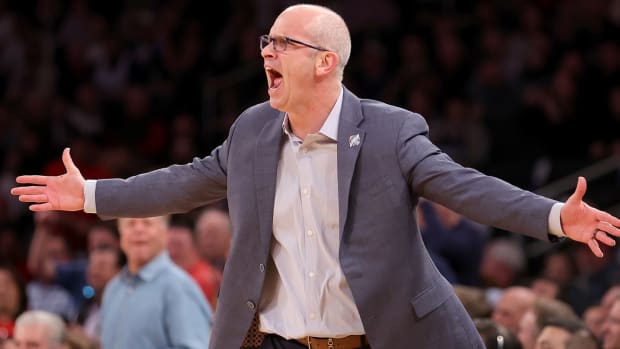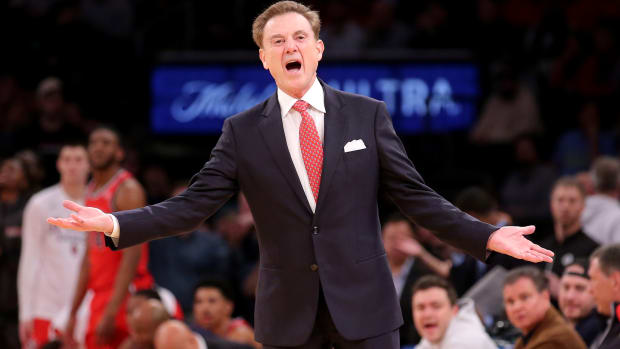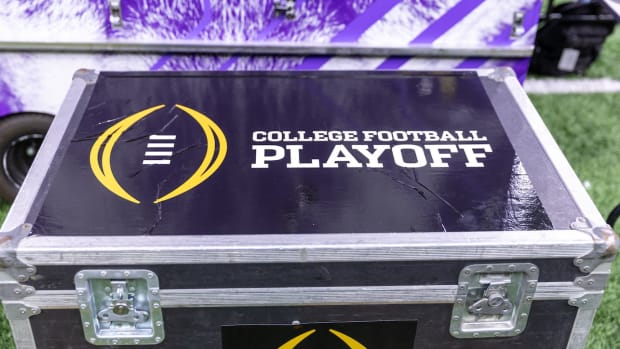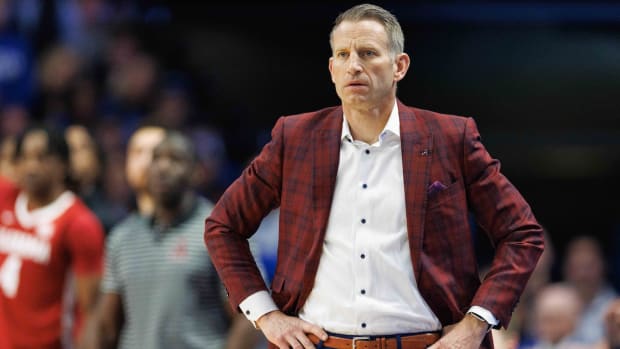Tennessee’s Lawsuit Against NCAA Opens Public Fight Over Rules Enforcement
For decades, the NCAA infractions process largely played out behind closed doors. Whatever contentiousness arose between the governing body of college sports and the schools who came into its investigative crosshairs, it often was kept private until a case approached resolution.
Those days are long gone. Case in point: Tennessee currently going after the NCAA with full public fury in reaction to a developing infractions case that Sports Illustrated first reported Tuesday. The strategy is to launch a PR campaign against a faceless and unpopular bureaucracy that is unlikely to return fire, rallying a large and loud base and increasing the pressure on an already besieged entity.
A day after the school released a fiery letter from chancellor Donde Plowman pushing back at a likely notice of allegations from NCAA Enforcement, politicians entered the fray.
Tennessee attorney general Jonathan Skrmetti, joined by his Virginia counterpart Jason Miyares, filed suit against the NCAA for name, image and likeness rules they deemed “anticompetitive,” in violation of the Sherman Antitrust Act. Meanwhile, Tennessee Governor Bill Lee chimed in on social media with his support of Plowman and condemnation of the NCAA. And Tennessee congressman David Kustoff took this opportunity to remind the public he introduced the NCAA Accountability Act last year to establish due process protections for those under investigation.
The joint lawsuit is the latest legal assault the NCAA is facing. That list includes a suit brought by the attorneys general for 10 states and the District of Columbia, challenging the association’s transfer rules—and the Department of Justice joined that suit earlier in January. There are civil suits filed on behalf of former college athletes that take direct aim at NCAA revenues and are likely to cause massive financial ramifications for the association.
The developments this week are focused on taking the fight to the NCAA regarding its ability to enforce NIL rules. And doing so loudly.
Plowman’s Monday letter to NCAA president Charlie Baker declared that NCAA Enforcement’s investigation of the Volunteers is “factually untrue and procedurally flawed.” The school began releasing the letter to media outlets shortly after Sports Illustrated broke the news of the ongoing investigation, which sources say is focused on NIL benefits for athletes in multiple sports.
The attorneys general upped the ante by taking the NCAA to court. From the complaint filed Tuesday: “[T]he NCAA is thumbing its nose at the law. After allowing NIL licensing to emerge nationwide, the NCAA is trying to stop that market from functioning. This month, it announced new proposals related to ‘student-athlete protections in NIL.’ These ‘protections’ allow current athletes to pursue NIL compensation. But it bans prospective college athletes (including current college athletes looking to transfer to another school who are in the ‘transfer portal’) from discussing potential NIL opportunities before they actually enroll. It’s like a coach looking for a new job, and freely talking to many different schools, but being unable to negotiate salary until after he’s picked one (the depressive effect on coaches’ wages in such a dysfunctional market is obvious).
“The NCAA bans the use of NIL contracts as a ‘recruiting inducement,’ meaning prospective athletes cannot negotiate NIL agreements before they commit to a member institution. A prospective athlete must commit, enroll, or transfer without understanding the NIL opportunities available at the destination or comparing those opportunities to the ones at competing schools. This NIL-recruiting ban limits competition and artificially decreases NIL compensation that college athletes could otherwise obtain in a free market.”

Tennessee is taking legal action against the NCAA for its potential NIL violations investigation.
Caitie McMekin/News Sentinel/USA TODAY NETWORK
It can be persuasively argued that elected officials should have better things to do with their time than fight the NCAA. But politicians love an easy win, and ginning up the fan base against potentially major sanctions against their favorite teams would qualify. The legal vulnerability of the NCAA also makes it an inviting target.
To whit; other suits aimed at the NCAA’s Tennessee investigation could follow in the coming days, according to prominent attorney Tom Mars. He represents Spyre Sports, the Knoxville-based agency that operates the Volunteer Club—the Tennessee booster collective the NCAA is probing.
All things considered, it’s open season on the NCAA’s authority to enforce its own rules. Those rules are established by NCAA member schools, of course—like Tennessee—but those members increasingly don’t want to abide by their own bylaws.
The NCAA responded Wednesday with a rare statement on an open investigation: “While the NCAA generally does not comment on specific infractions cases, it is important to remember that NCAA member schools and conferences not only make the rules but routinely call for greater enforcement of those rules and holding violators accountable. In recent years, this has been especially true as it relates to establishing and enforcing a consistent set of national rules intended to manage the name, image and likeness environment. This legal action would exacerbate what our members themselves have frequently described as a ‘wild west’ atmosphere, further tilting competitive imbalance among schools in neighboring states, and diminishing protections for student-athletes from potential exploitation. The NCAA remains firmly committed to protecting and expanding student-athletes’ NIL rights and opportunities. However, our membership has steadfastly supported the prohibition on impermissible recruiting contacts, booster involvement in recruiting prospects and the use of NIL offers as recruiting inducements.”
When the NCAA finally relented on allowing athletes to be compensated, it still attempted to apply a non-professional framework. According to the bylaws, NIL dollars could not be offered as recruiting inducements. But that ideal was quickly trampled in the competition for players, a lawless land rush that became a series of bidding wars. When the NCAA then lost control of the transfer market—failing to adequately enforce a one-time free transfer rule—the bidding market escalated into the wide-open market we see today.
Against this flood of free agency, NCAA Enforcement has been plugging away at plugging the dike. After being criticized for not enforcing NIL rules and tampering violations, it has finally gotten a foothold in a couple of areas—penalizing Florida State earlier in January, investigating Florida for the recruiting of quarterback Jaden Rashada (who never enrolled) and now Tennessee.
One of the focal points of the inquiry is Tennessee quarterback Nico Iamaleava, whose recruitment drew reports of an $8 million NIL contract signed while he was in high school. The New York Times reported Tuesday that one of the issues with Iamaleava’s recruitment was a collective transporting him by private jet to Knoxville.
Spyre Sports issued a statement Tuesday via Mars that said its contract with Iamaleava “had nothing to do with recruiting Nico to the University of Tennessee or other school.” Of course, if you go to the Knoxville-based company’s website, there is a link at the top of the page to “join the Volunteer Club,” and the firm compensates many UT athletes. Spyre co-founder and president Hunter Baddour also heads up the NIL collective Vol Club. The Vol Club’s show, “Vol Club Confidential,” features interviews with Tennessee athletes but usually begins with an appearance from Baddour to talk about upcoming events and fan opportunities.
In other words, it’s extremely difficult to separate the Vol Club from Spyre Sports and vice versa. Which means it’s difficult to say that Spyre Sports wasn’t acting as a representative of Tennessee’s interests with Iamaleava and other prospective athletes. That figures to be a point NCAA Enforcement is trying to establish.
But in the murky waters of NIL legislation, where the rules have been disregarded or have changed, the NCAA is having a hard time charting a forceful course. And everyone in the membership knows it. The days of quiet cooperation are over. For schools under investigation, the new response is to fight hard, fight loud and enlist your political allies to do the same on your behalf.


